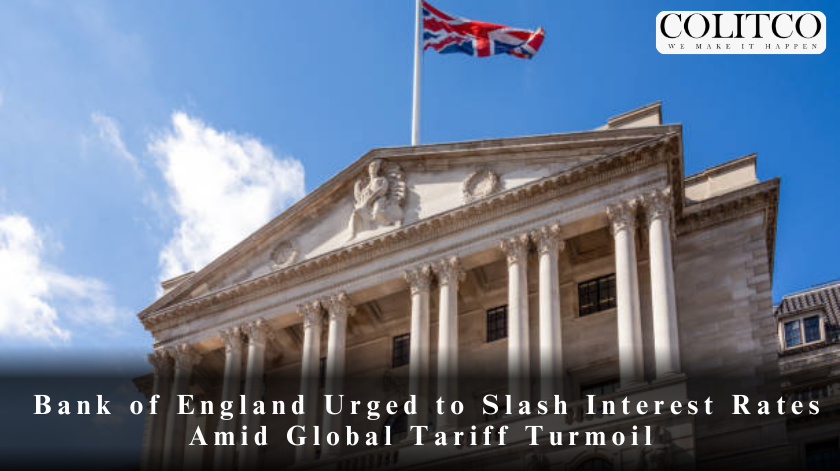The Bank of England is facing renewed calls to slash interest rates in response to mounting global economic uncertainty, sparked by sweeping trade tariffs imposed by former US President Donald Trump. Charlie Bean, a former deputy governor of the Bank and ex-chief economist at the Office for Budget Responsibility (OBR), has recommended an aggressive interest rate cut of at least 0.5 percentage points to bring rates down to 4% at the Bank’s next policy meeting in May.
Tariff Shockwaves Threaten Global Stability
Bean’s warning comes as Trump’s new tariff regime sends shockwaves through international markets, wiping trillions from stock valuations and shaking business and consumer confidence across the globe. In a dramatic move, Trump has imposed a blanket 10% tariff on imports from all countries trading with the United States, with higher tariffs hitting key partners—20% for the European Union and 34% for China. The policy, dubbed the “Liberation Day” plan, has ignited fears of a full-blown global trade war.
Bean, known previously for his hawkish stance on interest rates, acknowledged the need for a policy reversal given the magnitude of the economic disruption. “This is not just about tariffs,” he said. “It’s about the enormous uncertainty they create. Businesses and consumers are delaying critical investment and purchasing decisions.”
Calls for Emergency Action Before May
David Blanchflower, another former member of the Bank’s Monetary Policy Committee (MPC), supported Bean’s call but went further—urging the Bank to hold an emergency meeting before 8 May. He stressed the need for urgent action to shore up consumer sentiment and avoid a potential recession. “You need to really care about consumer confidence because when it falls, you are staring at a recession,” he said.
Financial markets have already priced in a more modest cut of 0.25 percentage points, taking rates to 4.25%. However, analysts expect two additional similar cuts by the end of the year, which would see UK interest rates fall to 3.75%.
Also Read: Create Your Own AI Action Figure with ChatGPT’s New Feature
Economic Outlook Continues to Darken
The OBR has forecast that a prolonged trade conflict of this magnitude could shrink the UK’s national income by 1% and extend the country’s period of economic stagnation by another year. Businesses are holding off on hiring and investment, while households are increasingly cautious in their spending.
Bean drew parallels to the 2008 financial crisis, recalling how the Bank of England defied market expectations with a surprise rate cut of 1.5 percentage points in November that year. “In 2008, everyone expected a 0.25 percentage point cut. But we had data from our regional agents that business orders had fallen off a cliff. We had to respond decisively—and we did.”
Policy Dilemma for the Bank
Today, the Bank faces a similarly delicate balancing act. Inflation, while easing, remains above target in some sectors, and there is concern that a large rate cut might stoke prices again. However, the current priority appears to be growth and stability.
Despite market expectations for gradual easing, Bean argues that hesitation could worsen economic fragility. “In an environment where people are unsure whether to invest or hire because they don’t know what tomorrow’s rules look like, waiting around isn’t good enough,” he said.
Blanchflower echoed this sentiment, warning that delayed action would make recovery more painful. “The last thing we need is to sit back and watch this unfold while confidence continues to drain out of the system,” he said.
Global Reverberations and Political Risk
Trump’s tariff plan has rattled not only markets but also global political alliances. By levying higher duties on major trade partners, Washington risks triggering retaliatory measures from China and the EU, potentially leading to cascading disruptions in supply chains, job markets, and financial systems.
Major institutions like JPMorgan have warned that Trump’s approach could significantly raise prices for US consumers and increase the likelihood of a recession in the United States—impacts that will inevitably spill over into the UK economy.
Looking Ahead
With just weeks to go before the next scheduled Bank of England meeting, pressure is mounting for policymakers to act decisively. Whether they heed calls for a bold intervention or maintain a cautious approach remains to be seen, but the message from former insiders is clear: the cost of delay could be steep.
As global uncertainties deepen, central banks like the Bank of England will be at the frontlines of defending economic stability—facing choices that may define the trajectory of growth and recovery for years to come.












